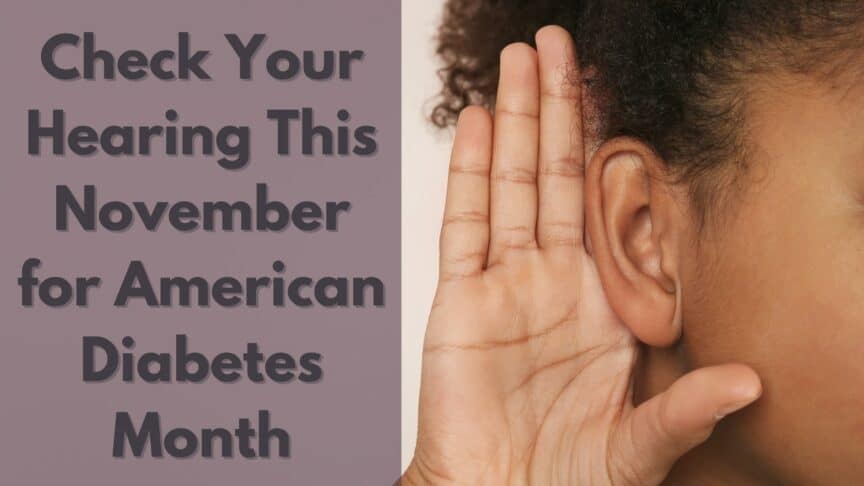Have you recently been diagnosed with diabetes? If so, you are not alone. It is estimated that there are 32.4 million people in the US alone, or one in 10 living with diabetes. The Center for Disease Control and Prevention (CDC) estimates that by 2050, 1 in 3 people will be affected. This is a serious condition and must be treated to stop the rampant rise in the US population.
This November is American Diabetes Month, an annual campaign to raise awareness and promote the importance of treatment. This year’s theme focuses on the importance of identifying prediabetes – an early stage of the disease, before it can progress into the many harmful side effects of this condition, such as heart issues, kidney failure, blindness, and amputation. As hearing healthcare professionals, we are particularly concerned with the risks, that diabetes poses to hearing health.
Hearing Loss in the US
The National Institute on Deafness and Other Communication Disorders (NIDCD) reports that currently one in eight or 48 million people in the US are affected by hearing loss, making it one of the most common conditions. Many underestimate the grave nature of this condition.
While it may seem like only a minor inconvenience to struggle to hear, over years these miscommunications add up. Hearing loss is, in most cases, irreversible, meaning that if you are struggling now with hearing people, it will most likely become worse. You may struggle to hear parts of words or sentences, making social interactions incredibly exhausting and anxiety-producing.
Over time, wedges are formed in professional and important personal relationships, causing chronic depression, anxiety, and loneliness in people who don’t address the issue in a timely manner. Part of the issue is that hearing loss often creeps up over years, in a manner so most don’t realize they have an issue at all.
The Diabetes-Hearing Loss Connection
Sensorineural hearing loss occurs when tiny hair-like cells, which are responsible for delivering sound information to the auditory cortex in the brain, become damaged or destroyed. This can be caused by many different factors, such as exposure to loud noise, impact on the head, infection, ototoxic chemicals, and issues with blood supply. Scientists suspect that diabetes-hearing loss connection occurs due to the way that diabetes affects blood flow to the inner ears.
Type 2 diabetes develops when the cells cannot properly absorb blood sugar, also known as glucose, into the cells. It usually achieves this using a hormone produced in the pancreas, called insulin. When the body cannot make enough insulin, the cells throughout the body can become damaged, including the fragile cells which deliver sound information to the brain. When these cells become damaged, they cannot regenerate, leaving many with permanent hearing loss.
Addressing Diabetes
It is important that if you’ve been diagnosed with diabetes, to take the condition seriously. If left ignored, diabetes can lead to serious conditions which affect the quality of life such as permanent hearing loss. Talk to your doctor about medications to take to keep your diabetes under control. It is also important to pay close attention to your lifestyle choices and modify factors that could progress symptoms of diabetes. It is best to stay active and prioritize exercise for 25 minutes at least three times a week. When you can get your heart rate up, your body uses more glucose levels and can help to keep blood sugar levels at a safe reading. It is also a good idea to pay attention to your diet. Avoid processed sugars, in favor of vegetables, fruits, whole grains, and lean proteins.
Hearing Loss as Diabetes Treatment
It is important to note, that if you have been diagnosed with diabetes or even prediabetes, that you should consider screening your hearing ability to monitor for a loss, as the CDC determined that diabetes doubles the risk of hearing loss. Prediabetes can be difficult to detect, as it has very few symptoms. While diabetes can develop at any age, it’s a good idea to start screening for diabetes every three years after you reach the age of 45. The sooner you can detect diabetes, the more of a chance you have of enjoying your health and quality of life for years to come. This November, celebrate American Diabetes Month, by scheduling a hearing exam now.

